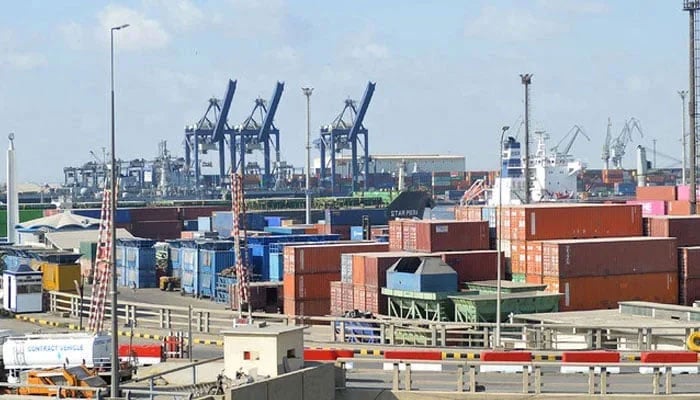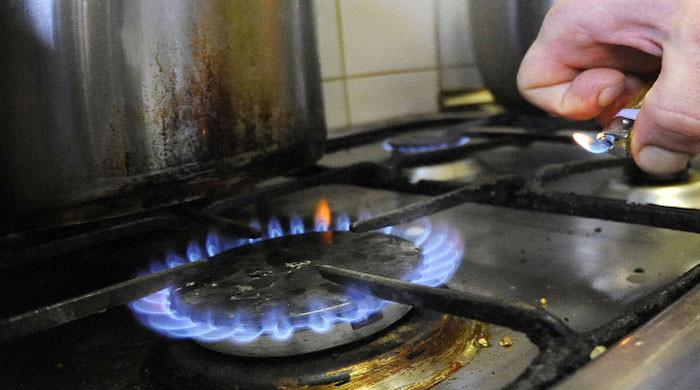Trump's 29% tariffs on Pakistan to 'cost up to $700m'
Dr Sohail says there's no need for alarm, Pakistan should engage its most important trade partner constructively
April 09, 2025

- Expert calls for making country's manufacturing competitive.
- Pakistan not collecting much revenue from US imports: Dr Sohail.
- He says Pakistan's trade policy issues identified by US are real.
ISLAMABAD: As Prime Minister Shehbaz Sharif-led government aims to address US President Donald Trump's 29% reciprocal tariff on the country, initial estimates suggest that the said duties might cost Islamabad between $500 to $700 million, The News reported on Wednesday.
Many experts consider it an opportunity for Islamabad in case of increased tariffs slapped on regional countries, especially against China. It's premature to ascertain any exact losses or benefits at this stage, however, one thing is guaranteed this step will be uncertain and may cause a recession in the US markets.
The Trump administration, last week, had announced reciprocal tariffs on several countries including the imposition of 29% duty on goods from Pakistan in response to a 58% tariff on US products charged by Islamabad.
According to a senior official at the Ministry of Commerce, Pakistani exports to the US will now face a total tariff of 39%, comprising a 10% baseline import duty and a 29% reciprocal tariff.
The US is Pakistan’s largest single-country export market, with exports valued at approximately $6 billion annually, predominantly textiles.
The new reciprocal tariffs established by the US president’s order are in addition to any other duties, fees, taxes, exactions, or charges applicable on some articles such as if the existing tariff on synthetic apparel is 32%, the new tariff will be 61% (32+29), reveals a paper prepared for the premier by the Commerce Ministry about the impact of the US tariffs on Pakistan exports.
Meanwhile, PM Shehbaz has constituted a 12-member steering committee to deal with the reciprocal tariffs.
Also, according to Finance Minister Muhammad Aurangzeb, a high-level delegation will travel to Washington to convey Pakistan’s position and further dialogue with US officials.
Expressing his views on the possible impact of these tariffs, Dr Safdar Sohail, a former bureaucrat who belonged to the Trade and Commerce group told the publication that the US move could be seen as two actions rolled into one: Trade Policy Review of different countries and activation of trade defence laws like anti-dumping, countervailing measures, punitive measures, etc. In routine, these actions would take years through the World Trade Organisation (WTO) system.
In this case, as there was one country doing this, for the rest of the world they had to be innovative in choosing the yardstick and be quick so that the appellate process kicks for everyone concurrently and at once.
Dr Sohail was of the view that as far as the impact of the reciprocal tariffs on Pakistan is concerned, the assessment of the Pakistan Business Council (PBC) seems very balanced. There is no need for alarm and panic and we should engage our most important bilateral trade partner constructively.
Under an International Monetary Fund (IMF) programme with serious external sector vulnerability, Dr Sohail said we should focus more on giving Pakistan an industrial policy to make the country’s manufacturing competitive and green under a unified framework, benefitting from the IMF Resilience and Sustainability Facility loan.
Many of the trade policy issues identified in the diagnostic of Pakistan’s Trade Policy by the US three days ago are real.
Assuaging the Americans on the trade deficit, between Pakistan-US, the expert said that Washington's approach should not be very hard because Pakistan was not collecting much revenue from the US imports.
Nor should it be hard to address most of the US concerns as we are already addressing some with the IMF reforms, he added.
Dr Sohail underscored that the real challenge was to integrate most of these concerns and the EU’s Green concerns in Pakistan's Green Industrialisation Strategy and implement it despite the well-entrenched non-green and unfair commercial practices.
We can delay it only at our peril. Our development would suffer more due to our failure on this account than the temporary increase in tariffs by the US, he concluded.











